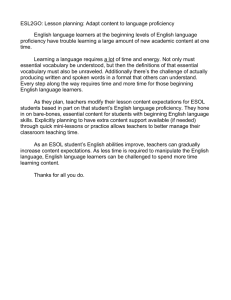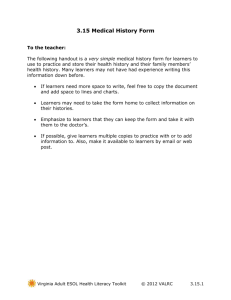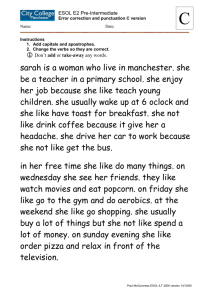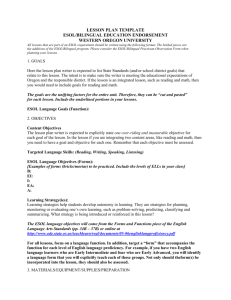Professional Focus Paper Course: ESOL Level: National 3
advertisement
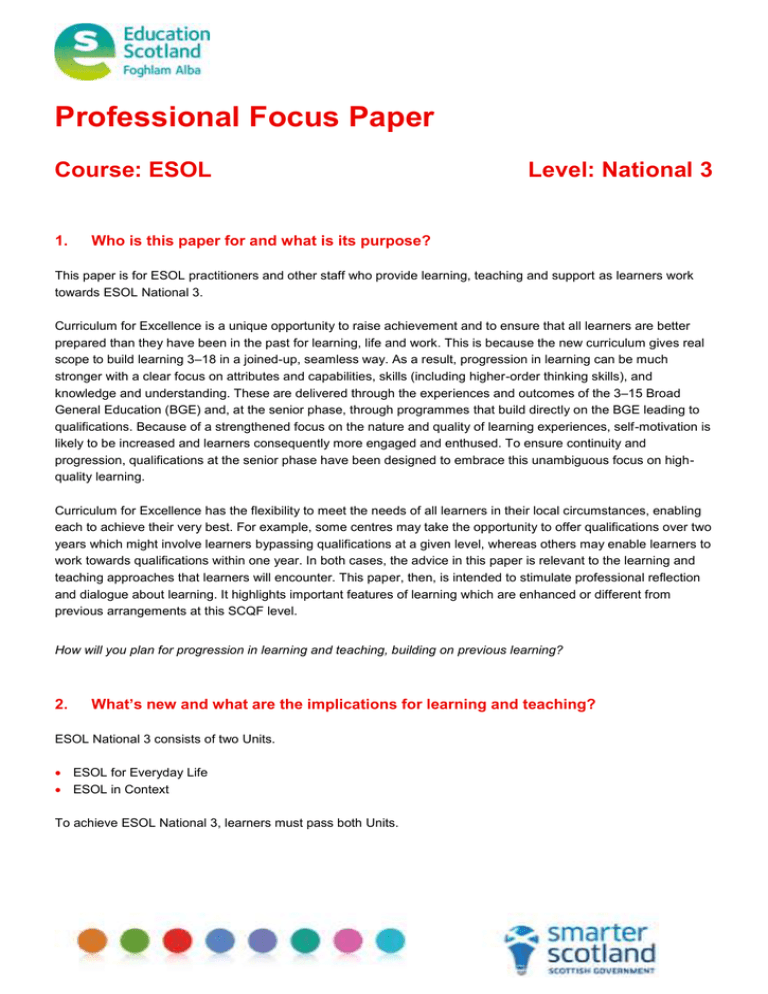
Professional Focus Paper Course: ESOL 1. Level: National 3 Who is this paper for and what is its purpose? This paper is for ESOL practitioners and other staff who provide learning, teaching and support as learners work towards ESOL National 3. Curriculum for Excellence is a unique opportunity to raise achievement and to ensure that all learners are better prepared than they have been in the past for learning, life and work. This is because the new curriculum gives real scope to build learning 3–18 in a joined-up, seamless way. As a result, progression in learning can be much stronger with a clear focus on attributes and capabilities, skills (including higher-order thinking skills), and knowledge and understanding. These are delivered through the experiences and outcomes of the 3–15 Broad General Education (BGE) and, at the senior phase, through programmes that build directly on the BGE leading to qualifications. Because of a strengthened focus on the nature and quality of learning experiences, self-motivation is likely to be increased and learners consequently more engaged and enthused. To ensure continuity and progression, qualifications at the senior phase have been designed to embrace this unambiguous focus on highquality learning. Curriculum for Excellence has the flexibility to meet the needs of all learners in their local circumstances, enabling each to achieve their very best. For example, some centres may take the opportunity to offer qualifications over two years which might involve learners bypassing qualifications at a given level, whereas others may enable learners to work towards qualifications within one year. In both cases, the advice in this paper is relevant to the learning and teaching approaches that learners will encounter. This paper, then, is intended to stimulate professional reflection and dialogue about learning. It highlights important features of learning which are enhanced or different from previous arrangements at this SCQF level. How will you plan for progression in learning and teaching, building on previous learning? 2. What’s new and what are the implications for learning and teaching? ESOL National 3 consists of two Units. ESOL for Everyday Life ESOL in Context To achieve ESOL National 3, learners must pass both Units. ESOL What are the key aspects of ESOL National 3? ESOL National 3 builds on the relevant experiences and outcomes from the BGE. It may also build upon knowledge of existing English-language skills developed through other English-language learning experiences. Learning and teaching approaches should reflect this progression with a clear focus on developing skills. Integrated approach to skills development Learning and teaching approaches should place an emphasis on skills development and the application of those skills which include: using English-language skills to research information and present findings; communicating with peers, colleagues and others to complete tasks; understanding English language in the contexts of everyday life, work and study and building on existing knowledge of English language in the contexts of everyday life, work and study. Learning and teaching approaches should therefore plan for flexibility, personalisation and choice. There should be opportunities to engage with a wide range of texts in different media and a variety of relevant learning contexts for developing and applying language skills that will further embed skills development. Hierarchy of Units Programmes of learning should be planned to encourage learners to aim for the highest level of achievement they can. The hierarchy of Units in ESOL allows staff to adopt a flexible approach; ensuring experiences are well suited to individual learners. Careful planning will be required for any movement between National 3 and National 4 so that learners may complete all of the necessary outcomes and assessment standards. What are the key features of learning in ESOL National 3? Learning and teaching settings ESOL National 3 has been designed to allow for delivery in various settings including schools, colleges and community-based settings. It allows for delivery to be contextualised to the setting and to the learners in that setting. Staff should consider the learners and plan delivery that is relevant and appropriate to those learners. For example, a learner in school may have different leisure time interests to a learner from an ESOL family learning group in the community, and the learning goals of a group of migrant workers in a particular workplace may be different to a group of ESOL learners who are refugees and asylum seekers. The broad-based contexts of the Units at National 3 allows for this flexibility. Personalisation and choice The learner-centred approach to learning and teaching in ESOL is common among ESOL staff in Scotland delivering in adult learning settings. English-language learning and teaching is effective when the learning is directly related to the needs of the learners in terms of their learning, family, community and work lives where learners can apply what they have learned. An emphasis on personalisation and choice may work to complement the existing approach that is adopted by many ESOL staff. Features of this approach could include negotiating and supporting learners to identify language-learning goals and objectives by using a learning plan; adapting resources and learning materials to ensure the learner is appropriately challenged in their learning and covering topics that are relevant to the learner. For example, this could be achieved by using work-related topics with learners in employment, or by using study-related topics with learners in schools. Staff will facilitate progression and support personalisation through the feedback they give to learners in relation to their language-learning development. How will you ensure that learning and teaching is appropriate and relevant to your ESOL learners? ESOL Enriching delivery Learning experiences will allow learners to build on existing knowledge and skills in English language. Staff should ensure that there are relevant opportunities for learners to apply their learning and understanding of English language to how they would use it in their lives. Staff should also encourage learners to develop and understand English-language learning in relation to their own language so that the contribution of learners who are bilingual or multi-lingual is recognised and included in developing a multi-lingual culture, both within the learning environment and externally. The ESOL classroom is already equipped with a rich base of learning, that is, the learners who come from a wide range of backgrounds and cultures. Staff should use this to help learners to develop awareness of other cultures and international citizenship. They should also help to foster collaborative learning approaches where learners can learn from each other and develop an awareness and respect for others. How will you ensure that learning and teaching in ESOL supports and includes the diversity of your ESOL learners? Naturally occurring evidence to support several outcomes Learning and teaching approaches should consider how skills are used and this may include a learner showing an understanding of a text they have read by discussing it with a peer or with a group of peers. Activities carried out for Unit topics may help to show evidence of a range language skills including, for example, listening and speaking or reading and speaking. In these ways staff may find naturally occurring evidence of progress in learning which can show progress across several outcomes. How will you plan learning sessions that will allow learners to develop all four language skills in an integrated fashion? Independent learning and taking responsibility for learning Learners are expected to develop independent learning skills and build on previous independent learning skills. In ESOL this may include learners adopting strategies to build on their English-language learning such as keeping a record of and revisiting new vocabulary, finding and recognising opportunities to use new vocabulary and language structures, taking a note of phrases and sayings picked up and finding out their meanings, getting involved in community groups or projects that require communication using English and taking opportunities to reflect on their learning. Curriculum for Excellence values promote opportunities to be creative in learning which may include providers linking up to offer a holistic approach to delivery for ESOL learners. How will you encourage learners to develop and build on independent study skills in English-language learning? ESOL Applying language learning and skills development Learners will build on the existing knowledge and skills in English language and use these skills in less familiar contexts. Learners will be encouraged to develop higher-order thinking skills as well as other skills for learning, life and work as a result of the learning and teaching approaches employed. Learning experiences should enable learners to develop, consolidate and demonstrate their use of English language skills for a variety of topics and situations that are relevant to the learner. ESOL links to literacy skills as well as skills for learning, life and work including citizenship skills and thinking skills. In developing language skills at National 3, what opportunities are being created for ESOL learners to apply their language skills? How are you supporting learners to develop skills for learning, life and work? 3. Qualification information The SQA website provides you with the following documents: Assessment Overview Course Specification Unit Specification Support Notes Course Assessment Specification Unit Assessment Support Packages Full information on arrangements for this qualification is available at the SQA website: ESOL National 3 http://www.sqa.org.uk/sqa/48590.html 4. What other materials are available on the Education Scotland website which staff could use? http://www.educationscotland.gov.uk/communitylearninganddevelopment/adultlearning/ESOL/framework/index.asp T +44 (0)141 282 5000 E enquiries@educationscotland.gov.uk W www.educationscotland.gov.uk Education Scotland, Denholm House, Almondvale Business Park, Almondvale Way, Livingston EH54 6GA © Crown copyright, 2012 You may re-use this information (excluding images and logos) free of charge in any format or medium, under the terms of the Open Government Licence providing that it is reproduced accurately and not in a misleading context. The material must be acknowledged as Crown copyright and the document title specified. To view this licence, visit http://www.nationalarchives.gov.uk/doc/open-government-licence or e-mail: psi@nationalarchives.gsi.gov.uk Where we have identified any third party copyright information you will need to obtain permission from the copyright holders concerned.
